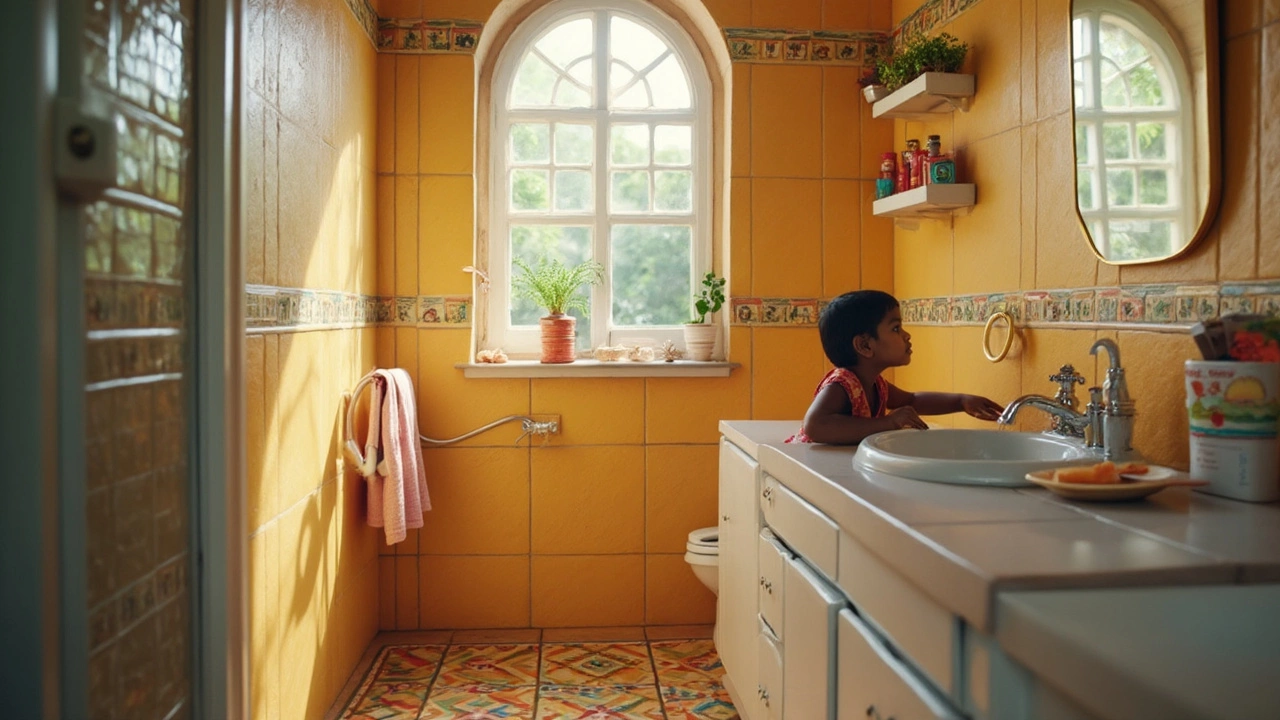Ever noticed water puddles around the sink or towels that are just out of reach? The truth is, most people wing it when installing a towel ring. Turns out, a few extra inches too close or too far can turn your morning rush into a wet, awkward juggle.
If you want quick drying and less mess, where you put your towel ring actually matters more than you think. Most pros say the sweet spot is about 20 to 22 inches above the sink counter and around 8 to 12 inches away from the edge of the sink. It’s just enough room to grab the towel in one move, but not so far you drip all over the floor.
But these numbers aren’t random—they’re based on years of bathroom installs and user habits. If you share the bathroom, it helps to base the height off the average person’s reach in your home. For kids, a few inches lower solves a lot of ‘Mom, I can’t reach’ complaints. Stay tuned to dodge the classic mistakes everyone makes before drilling holes in the wall.
- Why Placement Matters
- Standard Measurements & Guidelines
- Wall Choices and Obstacles
- Tips for Small Spaces
- Common Mistakes
- Quick Installation Advice
Why Placement Matters
The first thing most people overlook with bathroom accessories is how everyday use shapes your routine. The height and distance of a towel ring change how easy it is to dry your hands, plus they affect how much water ends up on the floor. Let’s face it—no one loves cleaning up wet drips because a towel was just too far out of reach.
Here’s what’s really at stake if you slap that ring too close to the sink: you risk bumping your elbows or having the towel bunch up against the backsplash, so it never really dries. Go too far away, and you track water across the countertop or, worse, onto the floor. This isn’t just annoying; it can actually add to slip risk—bathroom falls account for over 234,000 U.S. injuries every year, according to CDC data.
For families with kids or older adults in the home, the right placement actually makes a noticeable difference. Hanging a ring at the wrong height can leave little hands (or stiff shoulders) struggling. Basically, the smarter your towel ring placement, the more accessible and safer your space feels to everyone.
Towels themselves have their own needs. Stick them in a cramped spot? They’ll stay damp, which leads to unpleasant smells and even mildew over time. If you follow clear spacing guidelines, you’re way more likely to dodge those problems and keep things cleaner.
Here’s a quick look at how towel ring positioning can impact daily life:
| Placement | Pros | Cons |
|---|---|---|
| Too close to sink | Handy reach | Wet towels, buildup, cramped space |
| Too far from sink | Dryer towels, less splash | Drips on floor, inconvenient grab |
| Just right (8–12" from sink, 20–22" above) | Easy access, dries well, less mess | Requires measuring and planning |
So, nailing the towel ring placement saves you cleanup, keeps towels fresh, and makes your bathroom safer and more user-friendly. That’s pretty much a win all around.
Standard Measurements & Guidelines
Let’s be real: nobody wants to get splashed or have their towel end up dragging on the counter. When it comes to towel ring placement, numbers matter. The National Kitchen & Bath Association (NKBA) suggests hanging a towel ring so its bottom edge sits 20 to 22 inches above the counter. Not only does this make the towel easy to grab, but it also keeps it high enough to stay dry and out of the way.
"Keeping a towel ring roughly 8 to 12 inches from the edge of your sink provides just the right reach without splashing or stretching," says Alan Burke, a certified bathroom designer with over 25 years in the business.
Here’s a quick cheat sheet for standard towel ring placement:
- Height from counter to bottom of ring: 20–22 inches
- Distance from sink edge to center of ring: 8–12 inches
- Space needed above towel ring for easy grab: at least 8 inches between ring and any shelving or cabinet
Some folks ask if these numbers are set in stone. They're not, but they’re based on average sink and counter heights in North America. If your bathroom setup is out of the norm—say, you have a vessel sink or floating vanity—adjust accordingly. For homes with kids, it makes sense to drop the height by 4 to 6 inches so younger hands can reach.
Here’s a quick look at the usual measurements side by side:
| Placement Detail | Standard Range |
|---|---|
| Height from counter | 20–22 inches |
| Distance from sink edge | 8–12 inches |
| Kid-friendly height | 14–18 inches |
Before installing anything, grab a measuring tape and mark the wall with painter’s tape—that little step saves you from regrets and extra wall holes. For rental bathrooms, consider using adhesive models or brackets that require less commitment. No guesswork, just easy access and a tidier bathroom.
Wall Choices and Obstacles
Here’s where a lot of people trip up: picking the wall for your towel ring. You want it close enough for a quick grab—but not somewhere that blocks drawers, knocks into cabinet doors, or squeezes your elbows while you wash your hands. That’s the balancing act.
Most folks go for the wall right next to or behind the sink. If you have a vanity with side walls, the side wall usually works best because the towel ring stays within arm’s reach. For pedestal sinks with no cabinets, you’ll often have no choice but the wall directly beside or just behind the basin.
But what if there’s a mirror, medicine cabinet, or a window in the way? Here’s where planning pays off. Check for any switches, outlets, or pipes inside the wall using a stud finder; the last thing you want is to punch a hole straight into a wire or plumbing.
- If there’s only one free wall but it means leaning across the sink, move the ring closer to the front of the counter—people hate having to reach around stuff just to dry off.
- In a smaller bathroom, corner areas can work, but make sure there’s at least 8 inches between the ring and the sink so your towel doesn’t bunch up or drag in water.
- If you have tiled walls, you’ll need a special drill bit for tile. Don’t skip it—using the wrong tool can crack the tile.
Here’s a quick cheat sheet for common setups:
| Sink Type | Best Wall Placement | Considerations |
|---|---|---|
| Standard vanity | Side wall, 8-12" from edge | Check for drawers/cabinets |
| Pedestal sink | Closest side or behind sink | Watch for mirrors or windows |
| Double sink | Separate rings for each side wall | Avoid sharing a single ring |
Bottom line: don’t just eyeball it. Make sure your towel ring placement isn’t causing other headaches. When you plan for real-life use—kids running in, guests washing up, toothbrushes sitting close—you get it right the first time.

Tips for Small Spaces
There’s nothing quite like struggling to fit basic things in a tiny bathroom. If you don’t have much room, the usual towel ring setup can clash with shelves, mirrors, or even your faucet. Good news—there are smart ways to make it work, even if you’re short on wall space.
First, don’t feel locked in to one side of the sink. If there’s a cabinet or toilet nearby, it’s totally fine to mount the towel ring on the cabinet side panel or even behind the door, as long as you can reach it without dripping across the bathroom.
For really tight spots, pick a narrow towel ring that sticks out less from the wall. Some rings extend only 2.5 inches, instead of the usual 3.5 or more. That little difference matters in a cramped space.
- Look for ‘pivoting’ towel rings—they swing out so you can still use it, then tuck it back against the wall.
- Mounted vertically, not sideways, a towel ring often fits better between sink and mirror.
- Self-adhesive options save you drilling, which is nice if you rent or want to avoid wall anchors.
Here’s a quick comparison of space-saving towel ring sizes:
| Type | Projection from Wall | Best Use |
|---|---|---|
| Standard Ring | 3.5 inches | Regular wall, open space |
| Compact Ring | 2.5 inches | Small baths, next to cabinets |
| Pivoting Ring | Varies, folds flat | Behind doors, super tight spots |
One more thing—if you share the space, everyone reaching for the towel should be able to do it with one step or less. Awkward stretching leads to more mess and sometimes even banged elbows. You want your towel ring placement to feel almost automatic, even if the bathroom’s the size of a closet. Smart, right?
Common Mistakes
Mounting a towel ring might sound foolproof, but people make the same slip-ups all the time. The most frequent mistake is ignoring standard measurements and just eyeballing the spot. This usually puts the ring either too high or awkwardly low, right where you don’t want it. If you hang the ring too close to the sink, you’ll soak your wall and watch paint start to bubble or mold appear over time. Too far? You end up dripping water across the floor every time you reach for a towel.
Another blunder is placing the ring directly above an outlet or light switch. Not only does it look off, but you also risk causing an electrical hazard if water splashes over. It’s a simple check, but people still miss it. Then there’s ignoring the wall type. Not all bathroom walls are created equal—drywall, tile, or plaster each need a different type of anchor. Skip this step and your towel ring could be in pieces after just a few grabs.
- Mounting at the wrong height—standard is 20-22 inches above the counter.
- Placing the ring too close or too far from the sink edge (8-12 inches recommended).
- Blocking drawers, cabinets, or even the faucet itself so the towel keeps getting caught.
- Drilling without checking for wall studs or using the right anchors can pull the ring loose fast.
- Not considering door swing—sometimes a towel ring blocks the path of the bathroom or vanity door, which gets old quickly.
One last tip: always try a "dry run" by taping up the ring before drilling. Step back, see if it fits your reach and routine, and only then go for it. Trust the numbers—good towel ring placement gives the bathroom a cleaner look and just works better.
Quick Installation Advice
Don’t overthink it—installing a towel ring can be quick if you get the basics right. Here’s what’s proven to work for a lot of homeowners.
First, actually measure from the counter up. Guessing rarely works out. Use a tape measure to mark 20-22 inches above the sink counter for the bottom of the ring. Stick a piece of painter’s tape at your mark so you don’t lose your spot while you check the distance from the sink edge (shoot for 8-12 inches to the side, measured horizontally).
If you’re right-handed, put it on the right side for easy grabbing straight after hand washing; left-handed folks usually prefer the opposite. Double-check for pipes, wiring, or studs behind the drywall using a cheap stud finder or just give the wall a knock. You don’t want to hit anything important.
- Use a small level to keep the mounting bracket straight. Wonky rings never look right, and you’ll regret it every morning.
- Drill pilot holes—don’t go full force out of the gate. If you hit a stud, use wood screws instead of drywall anchors; otherwise, good anchors are a must so the ring doesn’t rip out with a good yank.
- Before tightening everything up, double-check the height and reach by holding the towel in place. Catching mistakes now saves patching holes later.
Once it’s in, give the ring a few firm tugs to make sure it’s secure. Put your hand towel through the ring and do a practice grab. Feels natural? If yes, you’re good. If not, it’s better to redo now than live with a clunky spot for the next decade.





